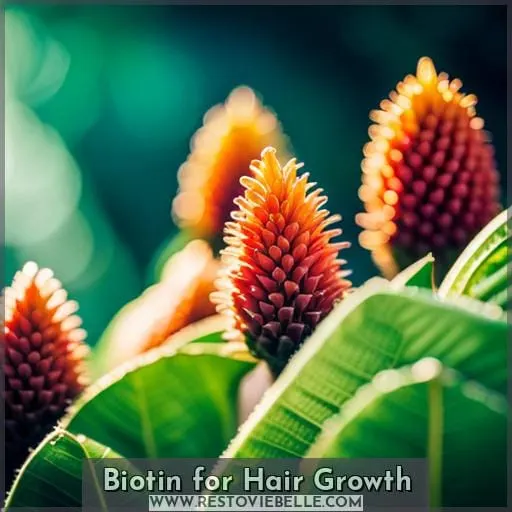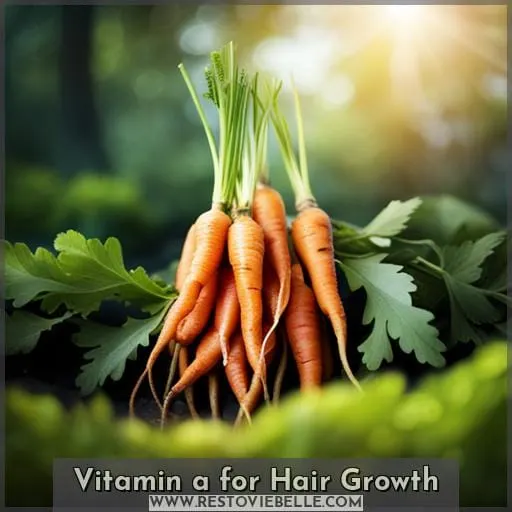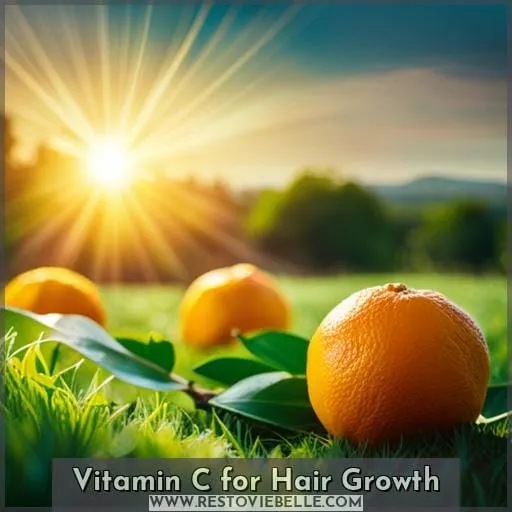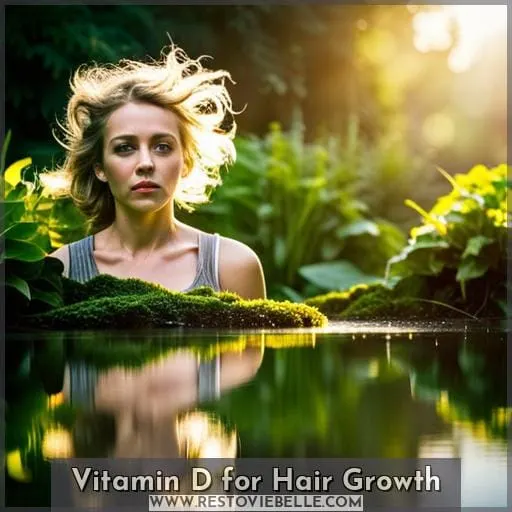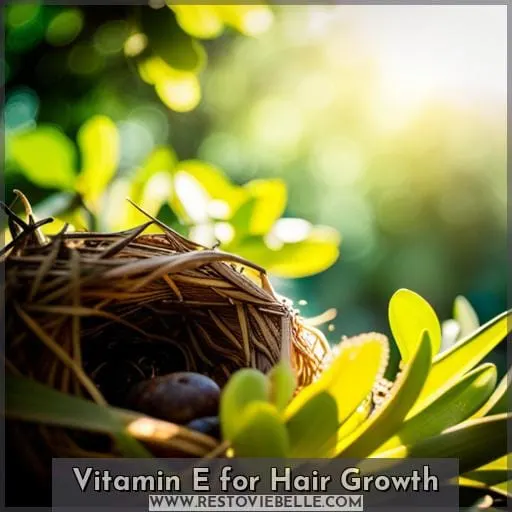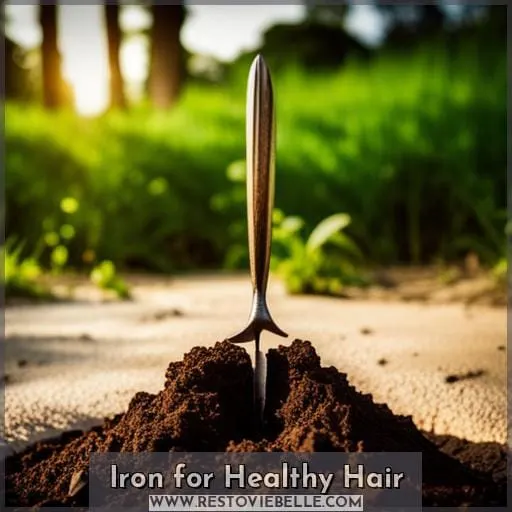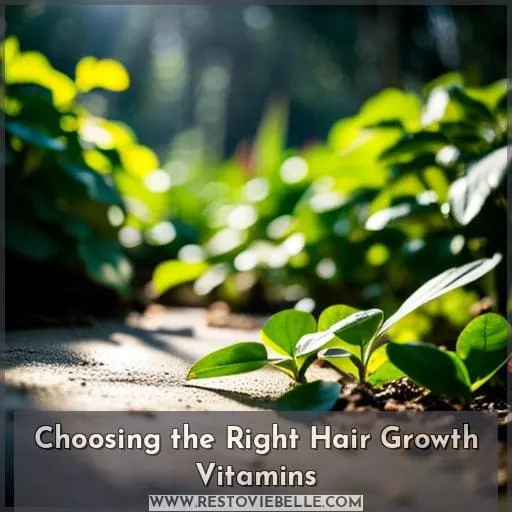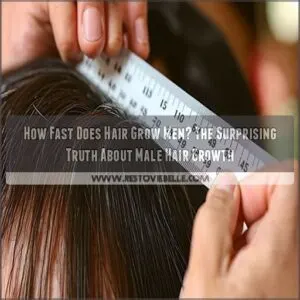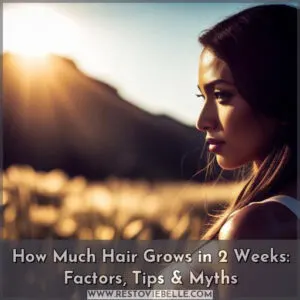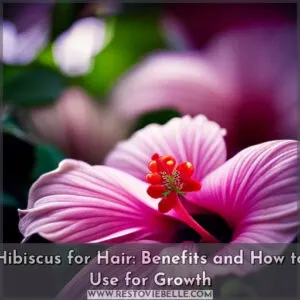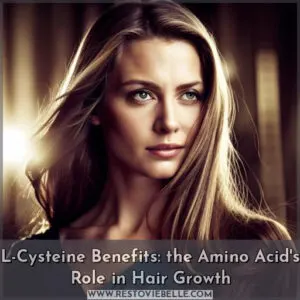This site is supported by our readers. We may earn a commission, at no cost to you, if you purchase through links.
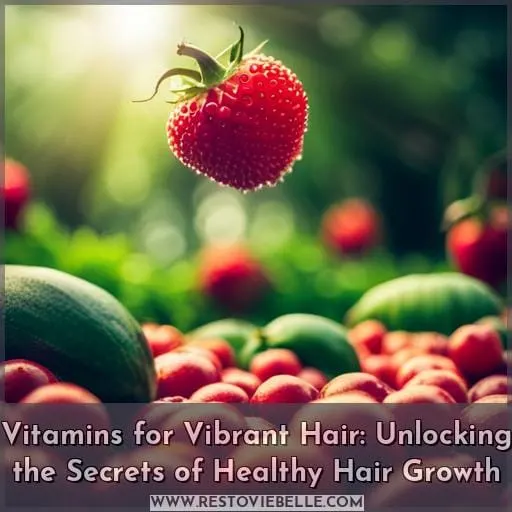 You’ve likely heard that you should eat a healthy diet for strong bones, a healthy heart, and a strong immune system.
You’ve likely heard that you should eat a healthy diet for strong bones, a healthy heart, and a strong immune system.
But did you know that certain vitamins are essential for healthy hair growth?
Vitamins like biotin, vitamin A, vitamin C, vitamin D, and vitamin E are all essential for maintaining healthy hair.
In this article, we’ll explore the role of each of these vitamins in promoting healthy hair growth and provide tips on how to get enough of them in your diet.
Table Of Contents
- Key Takeaways
- Biotin for Hair Growth
- Vitamin a for Hair Growth
- Vitamin C for Hair Growth
- Vitamin D for Hair Growth
- Vitamin E for Hair Growth
- Iron for Healthy Hair
- Zinc for Hair Growth
- Choosing the Right Hair Growth Vitamins
- Frequently Asked Questions (FAQs)
- How does stress affect hair growth, and what vitamins can help mitigate its impact?
- Can hair growth vitamins interact with other medications, and what precautions should be taken?
- Are there any potential side effects associated with taking hair growth vitamins, and how can they be minimized?
- How long does it typically take to see noticeable results from taking hair growth vitamins, and what factors influence the timeline?
- Are there any specific dietary changes or lifestyle adjustments that can be made to complement the use of hair growth vitamins for optimal results?
- Conclusion
Key Takeaways
- Biotin, Vitamin A, Vitamin C, Vitamin D, and Vitamin E are all essential vitamins for hair growth.
- Some of these vitamins help produce proteins like keratin and collagen, which give hair its structure and strength.
- Others act as antioxidants, protecting hair from damage and promoting cellular rejuvenation.
- Vitamin D deficiency has been linked to hair loss conditions, while Vitamin E helps maintain a healthy scalp and promotes hair growth.
Biotin for Hair Growth
Let’s delve into the world of biotin, a B vitamin crucial for hair growth.
Found in foods like eggs, almonds, and avocados, biotin helps your body produce keratin, a protein essential for strong, healthy hair.
The recommended daily intake of biotin is 30 micrograms, easily achievable through a balanced diet.
Food Sources Rich in Biotin
By eating biotin-rich foods like eggs, meat, fish, nuts, and seeds, you can promote your hair’s growth and keep it healthy.
Eggs:
A single large egg provides around 30 mcg of biotin, making it an excellent source of this essential nutrient.
Meat:
Beef, pork, and chicken are all good sources of biotin, with a 3-ounce serving providing around 10-20 mcg.
Fish:
Salmon, tuna, and sardines are all rich in biotin, with a 3-ounce serving providing around 5-10 mcg.
Nuts and Seeds:
Almonds, walnuts, and sunflower seeds are all good sources of biotin, with a 1-ounce serving providing around 2-5 mcg.
Recommended Daily Intake
The recommended daily intake of biotin is 30 micrograms.
You can easily get this from foods like eggs, meat, fish, nuts, and seeds.
While this amount is generally sufficient for most people, your individual needs may vary.
If you’re concerned about your biotin intake, talk to your doctor about whether a supplement is right for you.
High doses of biotin can interfere with certain lab tests.
It’s important to discuss your biotin intake with your healthcare provider before taking a supplement.
Vitamin a for Hair Growth
Vitamin A is essential for fast hair cell growth and overall hair health.
You can support your hair’s growth by consuming foods rich in vitamin A, such as sweet potatoes, carrots, spinach, and pumpkin.
These foods are packed with beta-carotene, which your body converts into vitamin A.
Role in Promoting Hair Cell Growth
Promote healthy hair cell growth by incorporating vitamin A into your daily diet.
Vitamin A plays a crucial role in the production of sebum, a natural oil that keeps your scalp and hair follicles healthy.
By maintaining a balanced intake of vitamin A, you can support the cellular rejuvenation process, ensuring optimal scalp health and creating a favorable environment for hair growth.
Experience the transformative power of a holistic approach to hair care, where dietary balance and nutritional synergy work together to unlock your hair’s full potential.
Food Sources Rich in Vitamin A
To ensure you’re getting an adequate intake of Vitamin A for promoting hair cell growth, include these food sources rich in this essential nutrient in your diet:
Sweet potatoes
Pumpkin
Carrots
Spinach
Kale
Vitamin A helps your hair grow long and strong.
Cook up a colorful stir-fry or whip up a refreshing smoothie to reap the benefits of dietary Vitamin A.
Vitamin C for Hair Growth
Vitamin C, a powerful antioxidant, tackles oxidative stress that can damage hair follicles.
It helps make collagen, a protein that gives hair its structure.
Eat citrus fruits, peppers, strawberries, tomatoes, and guavas to get your daily dose of vitamin C for healthier hair.
Role in Combating Oxidative Stress and Promoting Collagen Production
Vitamin C’s antioxidant power combats damaging free radicals and aids collagen synthesis, supporting healthy hair growth.
Stress reduction and a balanced diet rich in antioxidant foods like citrus fruits, bell peppers, and leafy greens promote collagen boosters, vital for healthy hair.
Prioritize hydration for optimal nutrient absorption and hair health.
A daily intake of 75-90 mg of vitamin C can optimize your hair care routine.
Food Sources Rich in Vitamin C
Boost your hair health with a nutrient-rich diet that includes an abundance of foods high in the vital antioxidant, vitamin C.
Citrus superfoods like oranges, grapefruits, and tangerines are packed with vitamin C, while vitamin C smoothies provide a refreshing way to kickstart your day.
DIY vitamin C masks can revitalize your scalp and promote collagen boost, leading to stronger, more lustrous hair.
Embrace the power of vitamin C for immunity and hair health, and unlock the secrets of vibrant, healthy hair growth.
Vitamin D for Hair Growth
Vitamin D deficiency has been linked to alopecia, female pattern hair loss, and excessive shedding.
To prevent these conditions and support healthy hair growth, include foods rich in vitamin D in your diet, such as:
- Fatty fish
- Cod liver oil
- Fortified foods
- Mushrooms
Exposure to sunlight can also help increase your vitamin D levels.
Role in Preventing Hair Loss Conditions
While vitamin D’s role in hair growth might not be as well-known, it still manages to play a crucial role in preventing hair loss conditions like alopecia.
Studies have shown that vitamin D deficiency is linked to alopecia, female pattern hair loss, and excessive shedding.
Ensuring adequate vitamin D levels through dietary recommendations, such as consuming fatty fish, cod liver oil, fortified foods, and exposing yourself to sunlight, can help maintain a healthy scalp and prevent hair loss.
Food Sources Rich in Vitamin D
Where can you find vitamin D, the nutrient that helps prevent hair loss conditions?
Bask in the sun’s golden rays, a natural source of vitamin D, to promote scalp and hair health.
Fortified foods like milk, yogurt, cereal, and fatty fish like salmon, tuna, and mackerel also pack a punch of this essential vitamin.
Regular consumption of these foods can help maintain healthy vitamin D levels, supporting your journey towards lustrous locks.
Vitamin E for Hair Growth
Vitamin E, a known antioxidant, helps protect your hair from oxidative stress.
It also assists in maintaining a healthy scalp and promoting hair growth.
Good sources include:
- Sunflower seeds
- Spinach
- Avocados
- Almonds
Recommended daily intake: 15 milligrams
Role as an Antioxidant and Promoter of Hair Growth
Vitamin E’s antioxidant properties help protect your hair from damage caused by free radicals, promoting a healthy scalp and strong hair growth.
It also supports the production of collagen, a protein essential for healthy hair follicles.
Additionally, vitamin E helps defend your hair cells against oxidative stress, which can lead to premature aging and hair loss.
By incorporating vitamin E into your diet, you’re giving your hair the nutrients it needs to thrive, resulting in vibrant, lustrous locks.
Food Sources Rich in Vitamin E
- Sunflower seeds: These tiny powerhouses are loaded with Vitamin E, providing a satisfying crunch to your salads, smoothies, and yogurt parfaits.
- Spinach: This leafy green isn’t just a Popeye favorite; it’s also brimming with Vitamin E, adding a nutritious boost to your sandwiches, salads, and stir-fries.
- Avocados: These creamy fruits aren’t only delicious but also packed with Vitamin E. Spread them on your toast, add them to your guacamole, or blend them into a smoothie for a nutrient-rich treat.
Recommended Dietary Allowance
To reap the benefits of vitamin E’s role in promoting hair growth, you should aim for a daily intake of 15 milligrams.
This nutrient-rich diet can be easily achieved through a balanced consumption of:
- Sunflower seeds
- Spinach
- Avocados
- Almonds
Consult a healthcare professional for personalized advice and a scalp biopsy to determine any underlying issues affecting your hair health.
Iron for Healthy Hair
Iron’s role in distributing oxygen to your hair cells is essential for hair cell repair and growth.
You can get the iron you need from foods like eggs, red meat, lentils, spinach, oysters, and clams.
Iron deficiency can lead to hair loss, so make sure you’re getting enough of this vital nutrient.
Role in Distributing Oxygen for Hair Cell Repair and Growth
You’ll find iron in eggs, red meat, lentils, spinach, oysters, and clams.
Iron fuels hemoglobin production to distribute oxygen for cell repair and growth.
This vital mineral delivers oxygen to your hair follicles, promoting a healthy scalp and optimal hair growth.
Iron also influences the production of growth factors, which are essential for hair follicle development and maintaining a healthy scalp environment.
Prioritize iron-rich foods to support your hair’s natural growth cycle and maintain its radiant vitality.
Food Sources Rich in Iron
Iron, an essential mineral for healthy hair, is found in abundance in foods like red meat, lentils, and spinach.
Iron plays a crucial role in distributing oxygen for hair cell repair and growth.
It’s important to ensure proper iron absorption by consuming heme sources like lean meats or pairing non-heme iron sources with vitamin C-rich foods.
Maintaining a nutritional balance that includes an iron-rich diet can help prevent conditions like alopecia caused by deficiencies or stress-induced hair loss.
In some cases of deficiency or inability to meet the recommended daily intake through food alone, supplemental iron may be necessary.
Zinc for Hair Growth
Zinc is a vital mineral that plays a key role in hair growth and maintenance.
It promotes hair growth by supporting cell division and protein synthesis.
It also helps maintain the health of the oil glands around your hair follicles, ensuring they produce enough oil to keep your hair moisturized and healthy.
You can get zinc from foods like beef, spinach, wheat germ, pumpkin seeds, oysters, and lentils.
The recommended daily dosage for adults is 11 mg for men and 8 mg for women.
Role in Promoting Hair Growth and Maintaining Oil Gland Function
Zinc, another essential mineral for healthy hair, promotes growth and maintains oil gland function around your hair follicles.
Just as a gardener tends to their plants, zinc nurtures your hair, ensuring a healthy scalp and strong strands. Its presence helps regulate hormones, minimize environmental damage, and ease stress.
Prioritizing zinc is like giving your hair a superpower shield, protecting it from stressors and promoting growth.
Food Sources Rich in Zinc
Load up on zinc-rich foods like beef, spinach, and lentils to support healthy hair growth.
Zinc, a vital mineral, plays a crucial role in boosting immunity, promoting cell growth, and maintaining a healthy scalp.
To ensure optimal zinc absorption, pair zinc-rich foods with those high in vitamin C, such as citrus fruits or bell peppers.
If you’re concerned about zinc deficiency, consult a healthcare professional for personalized advice and potential zinc supplementation.
| Food Source | Zinc Content (mg) |
|---|---|
| Beef | 7 |
| Spinach | 0.9 |
| Lentils | 3 |
Recommended Daily Dosage
Based on your dietary needs, your doctor can suggest a daily dosage of zinc to support healthy hair growth.
The recommended daily dosage for men is 11 milligrams, while women should aim for 8 milligrams.
If you’re struggling with hair loss or thinning, consider incorporating zinc-rich foods into your daily diet.
Zinc is naturally found in:
- Beef
- Spinach
- Wheat germ
- Pumpkin seeds
- Oysters
- Lentils
By maintaining a balanced nutritional intake and following your doctor’s recommendations, you can unlock the secrets to vibrant, healthy hair.
Choosing the Right Hair Growth Vitamins
When picking hair growth vitamins, consider:
- Your diet
- Health history
- Medications
Certain vitamins can interact with medications, so consulting a healthcare professional is essential to ensure safety and effectiveness.
Over-the-counter hair growth supplements like Nutrafol, Viviscal, and Hum Nutrition are popular options.
Their gender- and age-specific formulas target various causes of hair thinning.
Factors to Consider in Selecting Hair Growth Vitamins
When selecting hair growth vitamins, consider:
- Dietary intake
- Overall health
- Medications you’re taking
Evaluate:
- Nutritional balance to identify potential deficiencies
- Lifestyle, including stress levels and physical activity, as these can impact hair health
- Genetic influence, as certain hair conditions may have a hereditary component
- Hormonal factors, especially during pregnancy or menopause, can also affect hair growth
Lastly, manage stress through techniques like exercise or meditation to positively impact hair health.
Safety Precautions and Consulting a Healthcare Professional
Why take safety precautions and consult a healthcare professional before starting a hair growth vitamin regimen?
Expert insights reveal potential risks associated with excessive vitamin intake.
Consumer reviews highlight user experiences, both positive and negative.
Research findings suggest consulting a doctor for personalized advice, especially if you have underlying health conditions.
Understand your individual needs, potential drug interactions, and recommended dosages to harness the power of hair growth vitamins safely and effectively.
Frequently Asked Questions (FAQs)
How does stress affect hair growth, and what vitamins can help mitigate its impact?
Stress triggers hair loss by pushing follicles into a resting phase.
B vitamins, particularly biotin, and vitamin C combat stress-induced hair loss.
They support follicle health and reduce inflammation.
Can hair growth vitamins interact with other medications, and what precautions should be taken?
Hair growth vitamins can interact with certain medications, affecting their effectiveness or causing adverse reactions.
Consult your doctor before taking supplements if you’re on medication to ensure compatibility and avoid potential complications.
Are there any potential side effects associated with taking hair growth vitamins, and how can they be minimized?
Minimize potential side effects by consulting your doctor before taking hair growth vitamins, especially if you’re on other medications.
Excess vitamins A and C can be harmful, so tailored guidance is crucial.
How long does it typically take to see noticeable results from taking hair growth vitamins, and what factors influence the timeline?
Patience is a virtue when it comes to hair growth vitamins.
Results can take weeks or months to emerge, like a delicate flower blooming in due time.
Factors like diet, lifestyle, and genetics influence the timeline.
Nurture your hair with patience and persistence.
Are there any specific dietary changes or lifestyle adjustments that can be made to complement the use of hair growth vitamins for optimal results?
Complement hair growth vitamins with a balanced diet rich in essential nutrients.
Prioritize protein, biotin, vitamins A, C, D, and iron.
Exercise regularly to boost blood circulation to the scalp.
Manage stress levels to prevent hair loss.
Conclusion
To achieve vibrant and healthy hair growth, it’s important to incorporate essential vitamins into your diet.
Biotin, vitamin A, vitamin C, vitamin D, and vitamin E all play vital roles in promoting strong and luscious hair.
By consuming foods rich in these vitamins, such as eggs, carrots, citrus fruits, fatty fish, and nuts, you can ensure that your hair receives the nutrients it needs to thrive.
Remember to consult with a healthcare professional and consider factors like safety and dosage when selecting hair growth vitamins.

